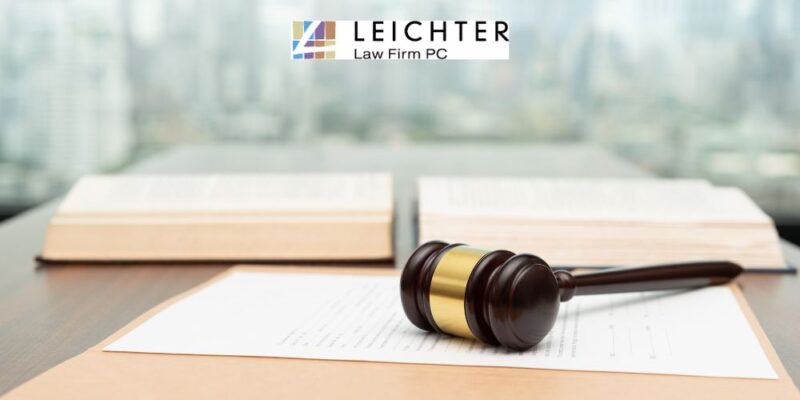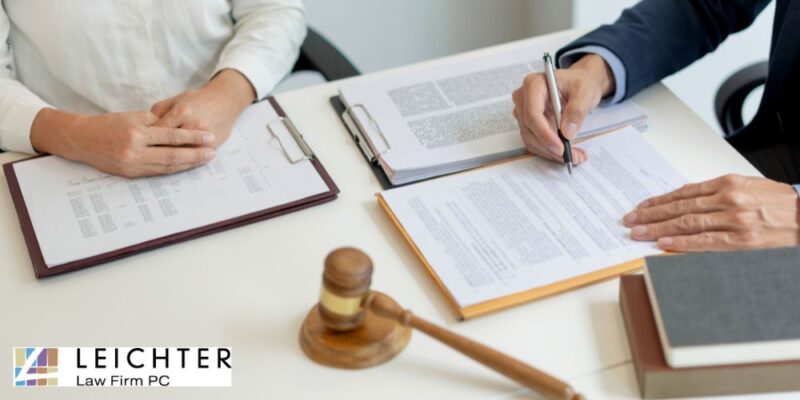Pharmacist License Defense Attorney in Austin and Houston, TX
Texas Pharmacist License Lawyer

Many serious potential repercussions can result from a Board of Pharmacy investigation, including probation and administrative penalty, or even the revocation of the license. These punishments can leave you unable to practice your profession, making it difficult to support yourself and your family. If you are facing penalties as a pharmacist in Texas, contact a pharmacist license defense attorney as soon as possible.
At the Leichter Law Firm, our Texas pharmacist license defense attorneys have experience defending the licenses and freedoms of a wide variety of pharmaceutical professionals. This includes both pharmacists and pharmacy technicians. If you are at risk of losing your license and would like to learn more about how we can help you defend against the allegations, please contact us today by calling 512-495-9995. Schedule your free consultation to discuss your case with a professional license defense attorney today.
What Is Considered Pharmacist Misconduct?
Much like other medical professionals, pharmacists have a certain duty of care to their patients. If a pharmacy licensee breaches that duty of care in some way, they could potentially face serious penalties from the licensing board in their state. Some common examples of pharmacist misconduct include the following.
- Medication errors: If a pharmacist dispenses the wrong medication, this can lead to serious complications for patients. Examples of medication errors include mixing up two drugs with similar names, applying the wrong label to prescription bottles, and mixing up prescriptions for different patients.
- Dosage errors: If a pharmacist dispenses the correct medication in the wrong dosage, this can also cause problems. In many cases, this occurs due to math errors or illegible physician handwriting.
- Failing to provide instructions or advise patients: Pharmacists are responsible for advising patients about their medications. They must inform them of the following.
- Interactions with certain foods or alcoholic beverages
- When to take the medication and how often to take it
- Risks to pregnant patients
- Warning labels
- Activities that are prohibited while taking the medication
- Incorrect directions: Pharmacists must also inform patients of how to take their medication. Failing to do so could result in complications for the patient.
- Failing to examine drug interactions: Pharmacists have software that allows them to check whether new medications will interfere or conflict with existing medications. Failing to do this could lead to patient harm.
- Failing to consider known allergies: If a patient has a known food or drug allergy, the pharmacist should refrain from dispensing medications that could cause them harm. If any conflicts arise, they must tell the patient and their prescriber.
Pharmacists and Drug Offenses
Pharmacists are responsible for carefully filling prescriptions and providing customers with the medications that they need. They regularly work around a number of powerful drugs that require concentration and integrity to handle reliably. For this reason, any practicing pharmacist is required to undergo rigorous schooling, background checks, and training to become licensed. If you are suspected of taking drugs for your own use or selling them to others illegally, you could be at risk of losing your license.
Types of Drug Offenses
Prescription drug abuse has become a hot topic in today’s media. State and federal agents have been cracking down harder on illegal prescription drug use, manufacturing, and distribution. A pharmacist who is believed to be abusing his or her professional position in order to illegally obtain drugs may face a variety of criminal charges for:
- Drug possession
- Drug manufacturing
- Drug trafficking
- Illegal sale of prescription drugs
- Issuing drugs without a valid prescription
In addition, you could be charged with related offenses such as theft and money laundering.
Who Regulates Pharmacists in Texas?
The Texas State Board of Pharmacy is responsible for regulating the practice of pharmacy, the operation of pharmacies, and the distribution of prescription drugs in the state of Texas. Under § 565.001 of the Texas Pharmacy Act, the Pharmacy Board may discipline a pharmacist for the following violations.
- Unprofessional conduct
- Engaging in fraud or deceit
- Criminal arrests, charges or convictions
- Substance abuse, chemical dependency, alcoholism
- Violation of a pharmacy, health and safety code, or other drug related statute
- Negligent practice of pharmacy
The Pharmacy Board may issue any of the following penalties pursuant to § 565.051 of the Texas Pharmacy Act: monitoring, administrative fine, public reprimand, license restrictions, probation, suspension, and revocation of the pharmacist’s license.
What Issues Could Lead to Disciplinary Action for a Pharmacist?
Just like other healthcare providers, licensed pharmacists can face penalties for certain actions. The Texas State Board of Pharmacy is quick to investigate and penalize pharmacists for issues that arise in either their personal or professional lives.
Personal Issues
Even the most dedicated pharmacists and pharmacist technicians can face penalties for issues that arise outside of their job. Many pharmacists face personal challenges that may or may not affect their ability to perform their job duties safely. Common personal issues that could lead to a complaint and investigation of a pharmacist include the following.
- Mental health problems
- Drug or alcohol abuse
- Physical health problems
- Criminal convictions
- Civil lawsuits and other legal problems
- Injury, illness, or death of a loved one
- Relationship problems, such as divorce or child custody disputes
- Financial problems
- Housing problems
Professional Issues
A pharmacist’s conduct while performing their job duties can also lead to complaints, investigations, and penalties. Unfortunately, many pharmacists face these challenges through no fault of their own. They may have inadequate experience, poor management, difficult patients, troublesome colleagues, or ineffective workplace equipment. Professional issues that can lead to a formal complaint or investigation include the following.
- Coding and billing errors
- Financial misappropriation
- Errors in filling prescriptions or providing patients with prescription information
- Dispensing medications without accurate prescriptions
- Errors in documenting drug transactions
- Practicing pharmacy without a current and valid license
- Labeling issues
- Dispensing controlled substances to unauthorized users
- Using pharmacy medications for personal reasons or for monetary gain
- Failing to complete patient records
What Is the Pharmacist License Complaint, Investigation, and Disciplinary Process?
The disciplinary process begins with a complaint and investigation by the Board of Pharmacy into alleged violations of the Pharmacy Act, Texas Occupations Code § 555.007. If, after investigation, the Pharmacy Board determines that grounds for discipline exist, formal charges may be filed against the pharmacist in accordance with 22 Texas Administrative Code § 281.30.
The pharmacist may then request an Informal Conference to resolve the matter informally as allowed by Texas Occupations Code § 565.056 and Texas Administrative Code § 281.22. Failure to resolve the contested case informally will result in an Administrative Hearing at SOAH, 22 Texas Administrative Code § 281.33.
Remember, the pharmacist may be represented by an attorney throughout the disciplinary process. Pharmacists are not trained to handle complex legal procedures such as those involved in the investigative process. Working with skilled pharmacist license defense attorneys is crucial for protecting both your license and your professional reputation.
Administrative Complaint Process for Pharmacists
If they find a violation or probable cause, the Texas Board of Pharmacy will file an administrative complaint with the State Office of Administrative Hearings (SOAH). The complaint will likely seek to penalize the pharmacist in some way. The pharmacist’s right to due process gives them the ability to request a hearing. They must do so within 21 days of receiving the complaint or waive their right to a hearing.
Board Hearings and Administrative Hearings
There are two types of hearings that a pharmacist may request: informal hearings before the Board and formal hearings in front of an administrative law judge. We strongly advise that you seek legal representation before requesting a hearing of any kind. License defense attorneys will have considerable experience defending pharmacists against accusations regarding their professional conduct.
At an informal board hearing, a board investigator will have already looked into the situation and determined that a violation occurred or that probable cause exists. The Board of Pharmacy will not settle disputes regarding facts. Rather, informal hearings are generally reserved for situations in which the licensee does not dispute the allegations and wishes to settle.
Formal hearings proceed similarly to civil cases in that both sides have a chance to argue their case and submit supporting evidence. They can also be used to dispute the facts of a case. Therefore, an informal hearing does not require the Board of Pharmacy to prove their case before they discipline a pharmacist. At a formal hearing, the other side must prove their case against you in order to discipline you.
Possible Penalties for Pharmacists
Several penalties are possible for pharmacists against whom the Texas State Board of Pharmacy have leveled a formal accusation. Examples of these penalties include the following.
- License suspension
- License revocation
- Limitations on practice
- Reprimands
- Remedial education
- Civil penalties and fines
- Reassignment
- Relocation
- Additional supervision and support
Can I Appeal a Decision by the Texas State Board of Pharmacy?
Yes. The licensee may appeal the decision of the Texas State Board of Pharmacy in accordance with Texas law. Having a license defense attorney on your side is crucial to have the best possible chance at a successful appeal. The team at Leichter Law will help you understand your right to appeal and initiate the appeal process on your behalf. Appellate cases can be just as complicated, if not more, as the original case. We have the experience you need to have the best possible chance at a successful outcome.
How to Protect Your Pharmacist License
The best way to protect your license is to hire an experienced pharmacy license defense attorney. Facing the Board or an administrative law judge on your own can be not only intimidating, but also mentally and emotionally taxing.
As soon as you learn of any complaints or allegations against you as a licensed professional, contact the Leichter Law Firm. We will evaluate the facts of your situation and help you craft a strong defense. Don’t wait until it’s too late – be proactive about protecting your career, reputation, and livelihood.
Contact a Texas Pharmacy License Defense Attorney at Leichter Law Today
If you are in danger of losing your pharmaceutical license and are concerned about the ramifications this may have on your future, the Leichter Law Firm may be able to help. To discuss your needs with one of our compassionate Texas pharmacy license attorneys, please contact us today by calling 512-495-9995.
Get in Touch
Office Locations
1602 E 7th St
Austin, TX 78702
Phone: (512) 495-9995
Get Directions
3700 N Main St
Houston, TX 77009
Phone: (713) 714-2446
Get Directions
214 N 16th St #128
McAllen, TX 78501
Phone: (956) 205-0884
Get Directions




